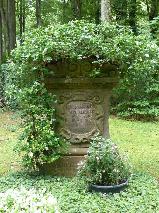Keilberth, Joseph |
| CONDUCTOR (GERMANY) |
|
BORN 19 Apr 1908, Karlsruhe, Baden-Württemberg - DIED 20 Jul 1968, München, Bayern CAUSE OF DEATH heart attack GRAVE LOCATION Grünwald, Bayern: Waldfriedhof, Tölzer Strasse (XIV) |
|
Joseph Keilberth was the son of a cellist at the theatre in Karlsruhe. From an early age he wanted to be a musician and his parents supported his aspirations. The first opera he saw was "Freischütz". The second was "Parsifal" and this led a devotion to Wagner's music for the rest of his life. He was taught the piano and his father gave him cello lessons. In 1928 he started his conducting career in Kralsruhe. In 1931 he was appointed second musical director at the Landestheater Baden. Soon he became first musical director and in 1935 he became general musical director. In 1939 he decided to leave Karlsruhe. He worked in Leipzig and Berlin before he went to the German Philharmonic Orchestra in Prague, after a recommendation by Wilhelm Furtwängler. In Germany the theatres were closed in September 1944, his orchestra continued to perform and even on 1 May 1945 the orchestra gave a concert. He was arrested and interrogated before he was put on a boat to Germany with his family. They went ashore in Pirna near Dresden. On 10 June 1945 he was asked by the authorities to resume musical life in Dresden as soon as possible. On 16 July he gave his first performance at the Kurhaus Bühlau at a time that many of his colleagues were banned from conducting. In 1949 he received the National Prize of the German Democratic Republic but he passed it on to the Staatskapelle Dresden. He lived in Dresden until 1950, but from 1948 to 1951 he was also the chief conductor of the Staatskappele Berlin at the Admiralspalast. In 1951 he was appointed conductor of the Philharmonic State Orchestra in Hamburg. He also continued working with members of his former orchestra in Praque who had now formed the Bamberg Symphony Orchestra in Franconia. In the 1950s he performed with this orchestra in Mexico, Havana and New York. Between 1952 and 1956 he also conducted at the Bayreuth festival. In 1954 he conducted "Tannhäuser" three days after Igor Markevitch had suddenly withdrawn as the conductor. In 1956 Wieland Wagner spoke of a 'marriage vacation', but Keilberth considered himself thrown out. In 1954 he conducted the only recorded performance of Matha Mödl as Sieglinde in "Die Walküre". In 1955 he made the first stero recording of Wagner's Ring cycle. In 1959 he obtained the position of General Musical Director in Bavaria. In 1963 he recorded Richard Strauss' "Arabella" with Lisa della Casa and Dietrich Fischer-Dieskau. In 1968, like Felix Mottl before him at the same location in 1911, he broke down on the stage during a performance of "Tristand und Isolde". He died soon afterwards in a clinic and was buried at the Waldfriedhof in Grünwald. Related persons • was helped by Furtwängler, Wilhelm • performed work of Wagner, Richard |
Sources • Scheibmayr, Erich, Gräber in Oberbayern - ausserhalb von München, Verlag Erich Scheibmayr, München, 1998 • Joseph Keilberth - Wikipedia (EN) • Der Musiker Gräber - Seite 10 - ALLGEMEINE KLASSIKTHEMEN - TAMINO-KLASSIKFORUM |



